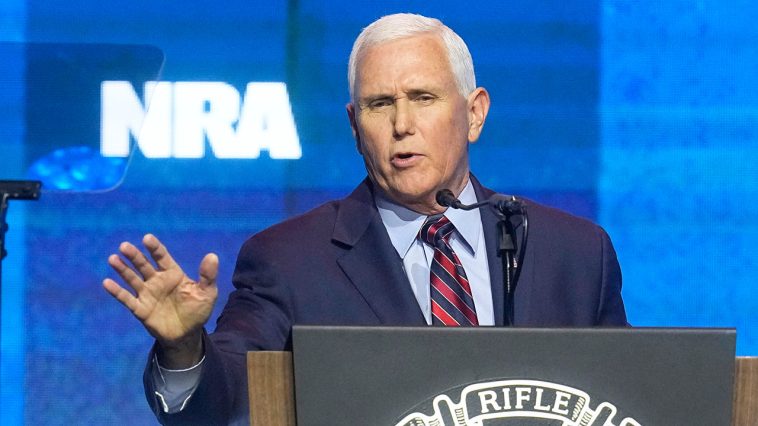LISTEN HERE:
On Thursday, former Vice President Mike Pence attended a closed-door hearing in front of a federal grand jury in Washington to discuss the Trump administration’s attempts to overturn the 2020 US Presidential election results. This came after an appeals court struck down an emergency motion to stop Pence from testifying. Sources have informed us that Pence’s testimony lasted for around seven hours; however, it remains unknown what information he provided to the prosecution.
Pence’s appearance is not only of great constitutional importance, but it also carries potential legal risk for former President Donald Trump. As the primary witness in the criminal investigation spearheaded by special counsel Jack Smith, Pence has insight into the events that transpired both within and outside the White House leading up to the January 6 Capitol attack. The investigation focuses on whether Trump attempted to unlawfully obstruct the election certification and defraud the United States in his quest to overturn the election results.
BREAKING: Mike Pence has just spent over 7 hours testifying before a federal grand jury who is investigating former President Donald Trump's attempts to overturn the election in 2020.
Details:
– The Grand Jury is the one related to Special Counsel Jack Smith’s investigation… pic.twitter.com/BexoFhXyrZ
— Brian Krassenstein (@krassenstein) April 27, 2023
Trump had pressured Pence to illegally reject electoral college votes for Joe Biden during a joint congressional session on January 6, 2021. In addition, Pence attended White House meetings that discussed objections to Biden’s victory, specifically with Republican lawmakers. Special counsel Jack Smith is particularly interested in these two interactions.
According to insiders, Pence has hinted to advisors that he will give a comprehensive testimonial of the events leading up to the attack on the Capitol. His recollection of the events includes information regarding Trump’s knowledge that such actions may have violated the law.
The hearing went forward after the US Court of Appeals for the DC Circuit rejected a last-minute legal challenge that sought to prevent Pence’s testimony on grounds of executive privilege. With this decision, Trump’s available avenues for appealing to the full DC Circuit or Supreme Court were effectively closed off.
Federal prosecutors have been trying to obtain Pence’s testimony for months, beginning with requests from the Justice Department last year. Following that, special counsel Jack Smith issued a grand jury subpoena for Pence as part of the complex criminal investigation into Trump’s tactics to maintain power.
Having watched Pence very closely the last couple of years, and analyzed his replies to questions about January 6th….I’m going to say this: Mike Pence almost certainly gave them GOLD today. He just wanted to be forced to do it. Watch.
— Jack Hopkins (@thejackhopkins) April 27, 2023
Immediately after the subpoena, Trump’s lawyers and Pence’s attorney raised objections to the request for Pence’s testimony. Trump’s team claimed executive privilege, limiting the former vice president’s testimony scope. Pence’s attorney argued that Pence’s position as Senate president on January 6 provided him protection from the legal scrutiny of the executive branch.
However, the new chief US judge for the court, James Boasberg, denied both attempts to restrict Pence’s testimony. He issued a full denial to Trump and a more nuanced ruling to Pence, upholding partial protection under speech or debate immunity. Boasberg also stated that this protection did not cover Pence from testifying about potentially criminal events.
In response to Judge Boasberg’s decision, Pence’s legal team chose not to contest the ruling. However, Trump’s lawyers disagreed and submitted an emergency motion, which judges Gregory Katsas, Patricia Millett, and Robert Wilkins denied on Wednesday.
Starting weeks after the 2020 election, Trump worked on persuading Pence to use his ceremonial role as Senate president on January 6 to challenge the legitimacy of Biden’s electoral votes and hinder his certification. This plan relied heavily on Pence accepting counterfeit slates of electors supporting Trump, forming the pretext for questioning the election outcome and preventing Biden from being declared president.
BREAKING: Mike Pence testified for 7+ hours before the federal grand jury today.
— Jack E. Smith ?? (@7Veritas4) April 27, 2023
The force to overturn the election results came not only from Trump but also from numerous other government officials and non-government actors. Among those involved were Trump’s attorney John Eastman, Trump campaign-affiliated lawyers Sidney Powell and Rudy Giuliani, and multiple Republican members of Congress.
Pence was in a unique position, as he had one-on-one discussions with Trump the day before the January 6 Capitol attack, as well as on the day of the attack itself. These conversations have led House January 6 Select Committee investigators to believe that there may have been a conspiracy of which the former president had prior knowledge.
While the potential repercussions for former President Trump remain uncertain, Mike Pence’s testimony will undoubtedly be highly significant in shedding light on the events leading up to the January 6 attack. As Pence navigates the delicate balance between loyalty and truth, it will be interesting to see what information he provides to the grand jury.
The investigation into Trump’s efforts to overturn the 2020 election results, as well as his attempts to block Pence’s testimony, demonstrate the critical nature of uncovering the truth behind the events surrounding the January 6 Capitol attack. As Americans, we must seek clarity and transparency to understand the events that occurred and hold those responsible accountable.
WOW! Mike Pence testified before the federal grand jury in the January 6th investigation today. That’s huge. Pence has a lot of knowledge here, and that’s why Trump tried to stop him.
This is TERRIBLE for Trump.
— Harry Sisson (@harryjsisson) April 28, 2023
As the nation awaits further revelations from Pence’s testimony and the grand jury’s proceedings, it is clear that this moment may have significant implications for both constitutional law and the pursuit of justice. The conservative demographic will surely be following the developments of this case closely to better understand the efforts made to overturn a lawful election, and potentially redefine the boundaries of executive privilege.


